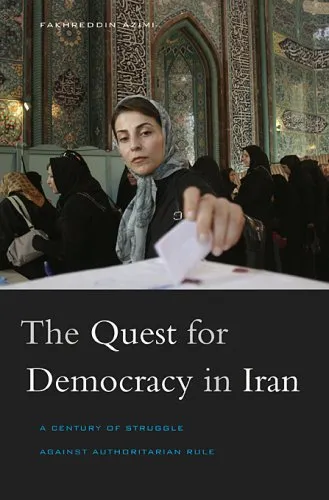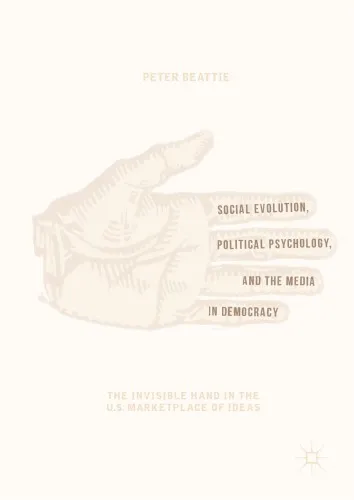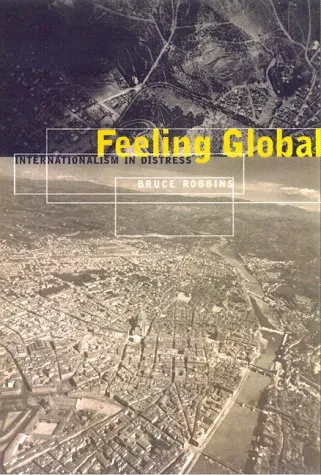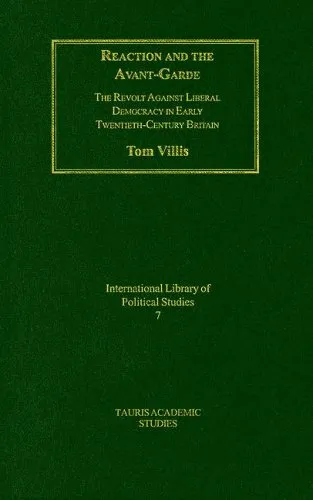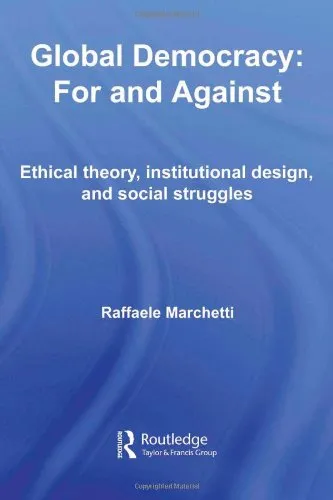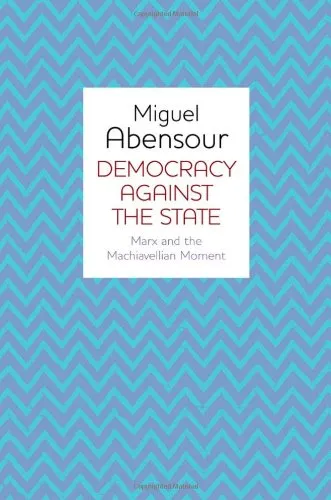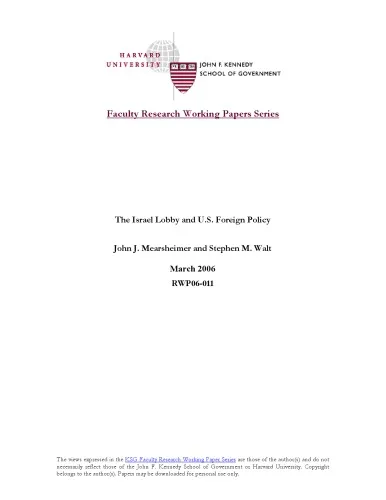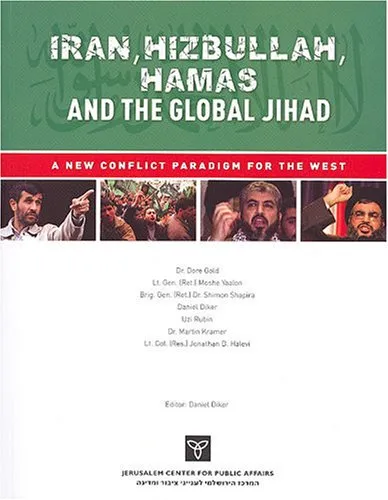The Quest for Democracy in Iran: A Century of Struggle against Authoritarian Rule
4.5
بر اساس نظر کاربران

شما میتونید سوالاتتون در باره کتاب رو از هوش مصنوعیش بعد از ورود بپرسید
هر دانلود یا پرسش از هوش مصنوعی 2 امتیاز لازم دارد، برای بدست آوردن امتیاز رایگان، به صفحه ی راهنمای امتیازات سر بزنید و یک سری کار ارزشمند انجام بدینکتاب های مرتبط:
معرفی کتاب 'The Quest for Democracy in Iran: A Century of Struggle against Authoritarian Rule'
کتاب 'The Quest for Democracy in Iran' اثر فاخر نویسنده نامدار، فخرالدین عظیمی، پژوهشی جامع و عمیق درباره تاریخچه پیچیده مبارزات مردم ایران در یک قرن گذشته برای دستیابی به دموکراسی است. این کتاب تلاشها و چالشهای مستمر ملتی را بررسی میکند که برای رهایی از اقتدارگرایی و استبداد بسیار کوشیدهاند. نویسنده با استفاده از سالها تحقیق و تجزیه و تحلیل تاریخ، روند پرفراز و نشیب مبارزه مردم ایران در برابر رژیمهای سرکوبگر را با دقت مستند کرده است.
خلاصهای جامع از کتاب
این کتاب در چندین بخش کلیدی به تبیین مبارزات ملت ایران برای تحقق مفاهیمی همچون آزادی، عدالت اجتماعی، و حکومت قانون میپردازد. فخرالدین عظیمی از زمان انقلاب مشروطه و اهمیت آن به عنوان اولین تلاش اصولی برای ایجاد حاکمیت مردمی آغاز کرده و تاثیر عمیق این حرکت را در زمینهسازی آگاهی سیاسی و حقوق شهروندی بررسی کرده است. کتاب سپس به بازههای تاریخی دیگر همچون دوران پهلوی، انقلاب اسلامی ۱۹۷۹ و پیامدهای آن، و جنبشهای مدنی مدرن، از جمله اعتراضات دانشجویی و اصلاحطلبی اشاره میکند.
تعامل میان نیروهای داخلی و قدرتهای خارجی نیز در این اثر مورد بررسی قرار گرفته است. از سیاستهای استعماری قدرتهای غربی گرفته تا بازیهای ژئوپلیتیکی، نویسنده تأکید دارد که شرایط ژئوپلیتیک ایران همواره تأثیرات سیاسی داخلی آن را پیچیدهتر کرده است. علاوه بر این، قدرتهای حاکم در هر دوره چگونه سرکوب دموکراسی و آزادی را سازماندهی کردند نیز از محورهای کلیدی این کتاب است.
نکات کلیدی
- بررسی عمیق تاریخ مشروطیت و تاثیر آن بر شکلگیری هویت سیاسی ایرانیان
- تحلیل چگونگی تغییر ساختارهای قدرت بر پویایی نهادهای دموکراتیک در ایران
- نقش روشنفکران، نخبگان سیاسی، و جنبشهای مردمی در پیشبرد دموکراسی
- افشای سیاستهای استبدادی رژیمهای حاکم و روشهایی که برای سرکوب مخالفان استفاده میکردهاند
- بررسی نسبت بین فرهنگ اسلامی و غربگرایی در روند دموکراسیخواهی
جملات مشهور از کتاب
"آرمان دموکراسی در ایران نه یک میراث وارداتی، بلکه جوشیده از قلب مبارزات آزاداندیشان داخلی است."
"اقتدارگرایی بیش از هر چیز، نه فقط سیاست بلکه روح و فرهنگ ملت را هدف میگیرد."
چرا این کتاب مهم است؟
کتاب 'The Quest for Democracy in Iran' اثری است که نه تنها به گذشته مینگرد بلکه آینده سیاسی ایران را نیز ترسیم میکند. این کتاب، با ترکیب تحلیل دقیق تاریخی و نگاه عمیق انسانی، درکی جامع از موانع پیش روی دموکراسی در ایران ارائه میدهد. برای هر فردی که علاقهمند به تاریخ، سیاست، و مبارزه حقوق بشر است، این کتاب به عنوان منبعی ارزشمند و بیبدیل میدرخشد. علاوه بر ارزش تاریخی، جایگاه آن در ادبیات مربوط به مطالعات خاورمیانه و دموکراسی بسیار برجسته است، زیرا دیدگاههای نویسنده فراتر از روایتهای معمول رفته و به روابط دین، سیاست و اجتماع نیز میپردازد.
این کتاب به دانشجویان، پژوهشگران، و علاقهمندان به تاریخ سیاسی ایران کمک میکند تا بهطور کامل با روندهای تاریخی و چالشهای اجتماعی و سیاسی آشنا شوند. فخرالدین عظیمی به روشنی موفق شده راهنمایی قابلاعتماد برای درک یکی از قدیمیترین و پیچیدهترین تلاشهای دموکراسیخواهی در تاریخ مدرن ارائه دهد.
Introduction to 'The Quest for Democracy in Iran: A Century of Struggle against Authoritarian Rule'
In "The Quest for Democracy in Iran: A Century of Struggle against Authoritarian Rule," Fakhreddin Azimi delves deeply into the turbulent history of Iran's persistent and often harrowing journey toward democratic governance. This book meticulously examines the sociopolitical landscape of modern Iran, charting more than a hundred years of efforts by Iranian citizens, intellectuals, and reformists in opposing authoritarianism and striving for a more just and equal political order. Azimi's work stands as a profound exploration of Iran's modern history, as well as a testament to the resilience and aspiration of its people for self-determination and freedom.
From the Constitutional Revolution of 1906 to the present-day complexities of its political governance, this book not only brings Iran's history into sharp focus but highlights the critical tension between the forces of despotism and reform. Azimi masterfully weaves a narrative of struggle, sacrifice, and perseverance, providing readers with an in-depth understanding of the historical currents that have shaped Iran’s political, cultural, and economic identity. At its core, "The Quest for Democracy in Iran" underscores the vital importance of democracy in the face of entrenched authoritarian structures.
Detailed Summary of the Book
The book is divided into key time periods that correspond to significant moments in the history of Iran's struggle for democracy. Starting with the Constitutional Revolution (1906-1911), Azimi explores how the ideals of constitutionalism and modern governance first gained traction in Iranian society. He delves into the challenges faced by early reformers as they grappled with the traditional monarchy, external pressures from colonial powers, and internal divisions within the country.
Moving forward, the book examines the authoritarian rule of Reza Shah Pahlavi, whose reign from 1925 to 1941 marked a significant departure from democratic aspirations. Azimi analyzes how modernization under Reza Shah came at the expense of political freedoms, stifling voices of dissent and consolidating power around the monarchy. The narrative is further expanded with a critical discussion of the post-World War II era, highlighting the nationalization of oil under Prime Minister Mohammad Mossadeq and the eventual CIA-backed coup of 1953, which derailed Iran's democratic momentum.
The book then transitions to the rule of Mohammad Reza Shah Pahlavi, whose authoritarian tendencies, particularly during the White Revolution and the establishment of the SAVAK (secret police), further alienated reformist elements. Azimi provides a detailed account of the Iranian Revolution of 1979, analyzing how this monumental uprising, initially a mass movement for democracy and social justice, ultimately resulted in the establishment of an Islamic Republic—a new form of authoritarian governance.
Finally, Azimi addresses the post-revolutionary era, from the consolidation of power under Ayatollah Khomeini to the reformist movements that emerged in the 1990s and beyond. He also examines how contemporary Iran continues to wrestle with the competing forces of authoritarianism and the people's enduring quest for democracy.
Key Takeaways
- Democracy in Iran has been a recurring aspiration, rising again and again despite repeated setbacks and challenges.
- Authoritarianism in Iran has taken multiple forms across different regimes, adapting to both historical and modern contexts.
- Reformists and intellectuals have consistently served as critical drivers of change, even under oppressive conditions.
- Iran's struggle for democracy is deeply intertwined with global geopolitics, including interference by colonial and foreign powers.
- The Iranian people have demonstrated extraordinary resilience and adaptability in their pursuit of a more equitable political order.
Famous Quotes from the Book
"The pursuit of democracy in Iran has always been as much a yearning for justice as it has been a demand for representation and accountability."
"The history of democracy in Iran is one of interruptions rather than continuities, but every interruption has nurtured a deeper commitment to the ideals of freedom."
"Authoritarianism in Iran has often sought to masquerade as reform, but the people’s unwavering will for true change has remained steadfast."
Why This Book Matters
"The Quest for Democracy in Iran: A Century of Struggle against Authoritarian Rule" is a seminal work that provides a nuanced and comprehensive understanding of Iran's modern history. It is not just a historical account but also a reflection on the universal struggles for freedom and justice. By engaging deeply with the historical trajectories of Iranian society, this book offers valuable insights into the complexities of political change, the challenges of reform, and the resilience of democratic ideals.
For scholars, policy-makers, and general readers alike, Azimi's work serves as an invaluable resource for comprehending the roots of contemporary Iranian politics. It underscores the pivotal role of history in shaping the present, while offering lessons that resonate far beyond Iran’s borders. The book is essential reading for anyone seeking to understand not only Iran but the global struggle between authoritarianism and democracy in the modern age.
دانلود رایگان مستقیم
شما میتونید سوالاتتون در باره کتاب رو از هوش مصنوعیش بعد از ورود بپرسید
دسترسی به کتابها از طریق پلتفرمهای قانونی و کتابخانههای عمومی نه تنها از حقوق نویسندگان و ناشران حمایت میکند، بلکه به پایداری فرهنگ کتابخوانی نیز کمک میرساند. پیش از دانلود، لحظهای به بررسی این گزینهها فکر کنید.
این کتاب رو در پلتفرم های دیگه ببینید
WorldCat به شما کمک میکنه تا کتاب ها رو در کتابخانه های سراسر دنیا پیدا کنید
امتیازها، نظرات تخصصی و صحبت ها درباره کتاب را در Goodreads ببینید
کتابهای کمیاب یا دست دوم را در AbeBooks پیدا کنید و بخرید
1474
بازدید4.5
امتیاز0
نظر98%
رضایتنظرات:
4.5
بر اساس 0 نظر کاربران
Questions & Answers
Ask questions about this book or help others by answering
No questions yet. Be the first to ask!
